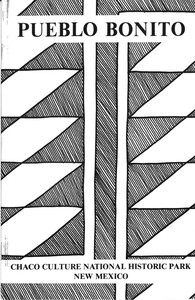Pueblo Bonito: Chaco Culture National Historic Park, New Mexico
"Pueblo Bonito: Chaco Culture National Historic Park, New Mexico" is an informative historical account produced in the late 20th century. This publication dives into the architectural and cultural significance of Pueblo Bonito, a large prehistoric Indian building representative of the Anasazi civilization in the American Southwest. It details the construction, excavation history, and social functions of this remarkable site within Chaco Canyon. The book outlines the extensive archaeological efforts that uncovered Pueblo
Bonito, highlighting its impressive size, architectural features, and the daily lives of its inhabitants. Constructed primarily between A.D. 1030 and 1079, Pueblo Bonito served as a hub for communal living, showcasing innovations in building techniques such as the use of thick walls and ceiling support structures. As readers explore the various sections of the pueblo, they learn about the roles of kivas for religious and communal activities, the significance of the surrounding environment for agriculture, and the cultural practices that shaped the lives of the Anasazi. Through such detailed descriptions, the book provides insight into the reasons behind the eventual abandonment of this once-thriving community, emphasizing the complexities of ecological and social factors at play. (This is an automatically generated summary.)
Read or download for free
| How to read | Url | Size | |||
|---|---|---|---|---|---|
| Read now! | https://www.gutenberg.org/ebooks/59155.html.images | 65 kB | |||
| EPUB3 (E-readers incl. Send-to-Kindle) | https://www.gutenberg.org/ebooks/59155.epub3.images | 1.5 MB | |||
| EPUB (older E-readers) | https://www.gutenberg.org/ebooks/59155.epub.images | 1.5 MB | |||
| EPUB (no images, older E-readers) | https://www.gutenberg.org/ebooks/59155.epub.noimages | 80 kB | |||
| Kindle | https://www.gutenberg.org/ebooks/59155.kf8.images | 1.5 MB | |||
| older Kindles | https://www.gutenberg.org/ebooks/59155.kindle.images | 1.5 MB | |||
| Plain Text UTF-8 | https://www.gutenberg.org/ebooks/59155.txt.utf-8 | 41 kB | |||
| Download HTML (zip) | https://www.gutenberg.org/cache/epub/59155/pg59155-h.zip | 1.3 MB | |||
| There may be more files related to this item. | |||||
Similar Books
About this eBook
| Creator | Southwest Parks and Monuments Association |
|---|---|
| Title | Pueblo Bonito: Chaco Culture National Historic Park, New Mexico |
| Note | Reading ease score: 67.5 (8th & 9th grade). Neither easy nor difficult to read. |
| Credits |
Produced by Stephen Hutcheson and the Online Distributed Proofreading Team at http://www.pgdp.net |
| Language | English |
| LoC Class | F786: United States local history: New Southwest. Colorado River, Canyon, and Valley |
| Subject | Pueblo Indians -- New Mexico -- Chaco Canyon -- Antiquities |
| Subject | Archaeological parks -- New Mexico -- Chaco Canyon |
| Subject | Pueblos -- New Mexico -- Chaco Culture National Historical Park |
| Subject | Chaco Culture National Historical Park (N.M.) |
| Category | Text |
| EBook-No. | 59155 |
| Release Date | Mar 29, 2019 |
| Copyright Status | Public domain in the USA. |
| Downloads | 91 downloads in the last 30 days. |
| Project Gutenberg eBooks are always free! | |

